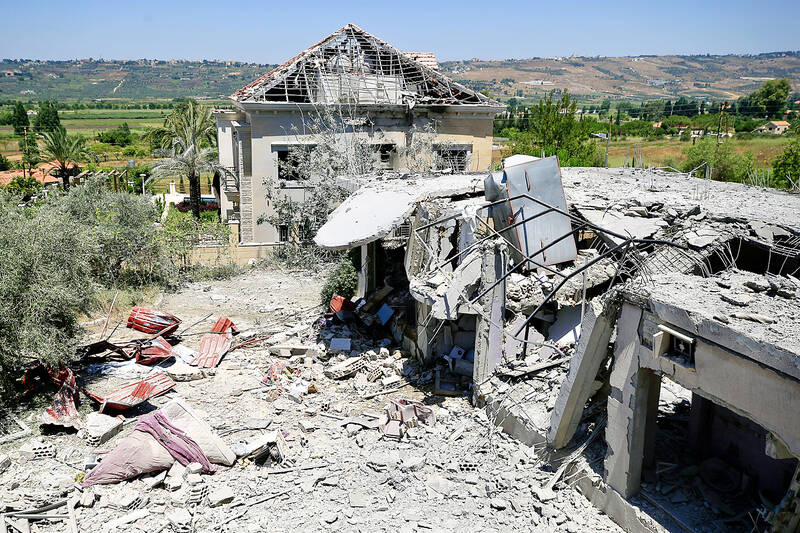Israel on Wednesday said that it does not want war in Lebanon, but could send its neighbor “back to the Stone Age.”
The border between the two countries has seen daily exchanges of fire between Israeli forces and Hezbollah militants since the attack on Israel by Hezbollah’s ally Hamas on Oct. 7 last year, which triggered the war in Gaza.
Fears those exchanges could escalate have grown in the past few weeks as cross-border attacks intensified and after Israel revealed it had approved plans for a Lebanon offensive, prompting new threats from Hezbollah chief Hassan Nasrallah.

Photo: EPA-EFE
Israeli Minister of Defense Yoav Gallant said during a visit to Washington that his country could “take Lebanon back to the Stone Age, but we don’t want to do it.”
“We do not want war, but we are preparing for every scenario,” Gallant told reporters. “Hezbollah understands very well that we can inflict massive damage in Lebanon if a war is launched.”
Israel’s allies, including the US, have been keen to avoid such an eventuality.
A US official said that Washington was engaged in “fairly intensive conversations” with Israel, Lebanon and other actors, and believed that no side sought a “major escalation.”
US Secretary of Defense Lloyd Austin on Tuesday told Gallant that another war with Hezbollah could have “terrible consequences for the Middle East” and urged a diplomatic solution.
UN Under-Secretary-General for Humanitarian Affairs Martin Griffiths on Wednesday told reporters in Geneva that Lebanon was “the flashpoint beyond all flashpoints.”
“It’s beyond planning. It’s potentially apocalyptic,” Griffiths said.
A war involving Lebanon “will draw in Syria ... it will draw in others,” he added. “It’s very alarming.”
Lebanon’s national news agency reported about 10 Israeli strikes on Wednesday on areas near the border, including one at about 10pm that destroyed a building in Nabatiyeh, wounding five people.
There was no immediate comment from the Israeli military on the strike.
Hezbollah on Wednesday claimed six attacks against Israeli military positions in the border region.
As Israel’s war against Hamas in the Gaza Strip nears its 10th month, bombardments in the Palestinian territory appeared to ease after Israeli Prime Minister Benjamin Netanyahu said the “intense phase” of Gaza operations was winding down.
Some of those forces would likely then be redeployed to the Lebanese border, but “primarily for defensive purposes,” Netanyahu said.
US officials including Secretary of State Antony Blinken have voiced hope that a ceasefire in Gaza could lead to a reduction in hostilities on the Lebanese border as well.
During the night from Wednesday to yesterday, witnesses reported bombings in areas around the Gaza Strip, while fighting had raged earlier on Wednesday between Israeli troops and Palestinian militants in Gaza’s southern city of Rafah.
The civil defense agency and medics said that at least four people were killed in a strike on a house in Beit Lahia, in the north.
However, agency spokesman Mahmud Basal told reporters that “there have been almost no attacks” and “the rest of the areas in the Gaza Strip are calm compared to yesterday.”

‘TERRORIST ATTACK’: The convoy of Brigadier General Hamdi Shukri resulted in the ‘martyrdom of five of our armed forces,’ the Presidential Leadership Council said A blast targeting the convoy of a Saudi Arabian-backed armed group killed five in Yemen’s southern city of Aden and injured the commander of the government-allied unit, officials said on Wednesday. “The treacherous terrorist attack targeting the convoy of Brigadier General Hamdi Shukri, commander of the Second Giants Brigade, resulted in the martyrdom of five of our armed forces heroes and the injury of three others,” Yemen’s Saudi Arabia-backed Presidential Leadership Council said in a statement published by Yemeni news agency Saba. A security source told reporters that a car bomb on the side of the road in the Ja’awla area in

PRECARIOUS RELATIONS: Commentators in Saudi Arabia accuse the UAE of growing too bold, backing forces at odds with Saudi interests in various conflicts A Saudi Arabian media campaign targeting the United Arab Emirates (UAE) has deepened the Gulf’s worst row in years, stoking fears of a damaging fall-out in the financial heart of the Middle East. Fiery accusations of rights abuses and betrayal have circulated for weeks in state-run and social media after a brief conflict in Yemen, where Saudi airstrikes quelled an offensive by UAE-backed separatists. The United Arab Emirates is “investing in chaos and supporting secessionists” from Libya to Yemen and the Horn of Africa, Saudi Arabia’s al-Ekhbariya TV charged in a report this week. Such invective has been unheard of

US President Donald Trump on Saturday warned Canada that if it concludes a trade deal with China, he would impose a 100 percent tariff on all goods coming over the border. Relations between the US and its northern neighbor have been rocky since Trump returned to the White House a year ago, with spats over trade and Canadian Prime Minister Mark Carney decrying a “rupture” in the US-led global order. During a visit to Beijing earlier this month, Carney hailed a “new strategic partnership” with China that resulted in a “preliminary, but landmark trade agreement” to reduce tariffs — but

SCAM CLAMPDOWN: About 130 South Korean scam suspects have been sent home since October last year, and 60 more are still waiting for repatriation Dozens of South Koreans allegedly involved in online scams in Cambodia were yesterday returned to South Korea to face investigations in what was the largest group repatriation of Korean criminal suspects from abroad. The 73 South Korean suspects allegedly scammed fellow Koreans out of 48.6 billion won (US$33 million), South Korea said. Upon arrival in South Korea’s Incheon International Airport aboard a chartered plane, the suspects — 65 men and eight women — were sent to police stations. Local TV footage showed the suspects, in handcuffs and wearing masks, being escorted by police officers and boarding buses. They were among about 260 South